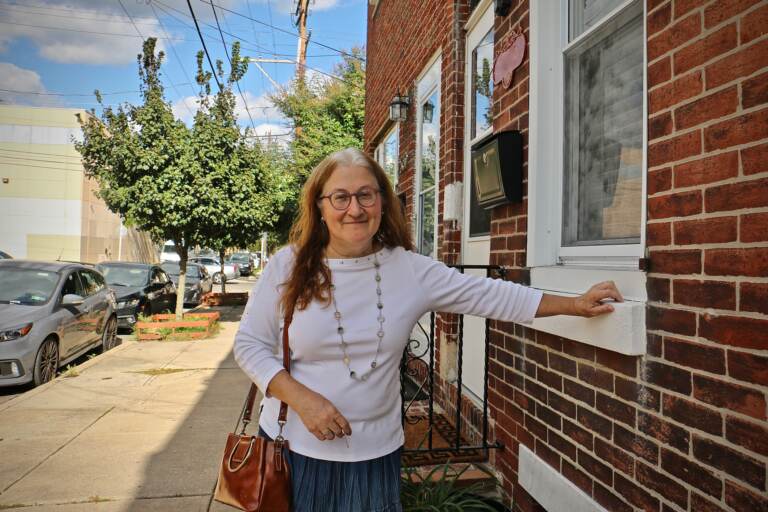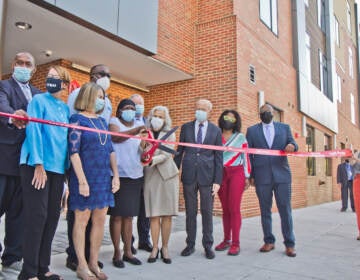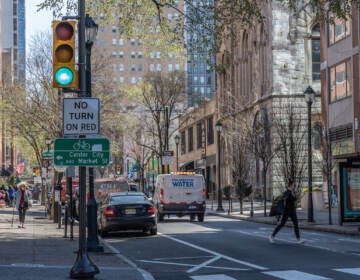As more Philly landlords move to sell and hold off on repairs, analysts see a threat
Nearly 21% of Philadelphia landlords listed a property for sale in 2020, according to a study by researchers at the University of Pennsylvania and Harvard.
Listen 1:50
Carolyn Boxmeyer just sold her rental property in Fishtown. (Emma Lee/WHYY)
Sandi Lichtman can’t wait to sell the Center City building she and her husband bought 30 years ago to house his medical practice.
They’re both ready to retire. But Lichtman said she’s also tired of complying with the city’s growing list of regulations for landlords, including a 2019 requirement that they cover the full cost of bed bug remediation.
“I don’t wanna deal with property management. I’d be happy just to be done with it,” Lichtman said.
The mixed-use building has three apartments. During the pandemic, Lichtman said one of her tenants, an online entrepreneur, moved in and never paid rent, knowing she couldn’t be evicted under the city’s emergency moratorium.
It cost Lichtman more than $10,000, she said. She said the loss didn’t deepen her desire to sell. Neither did the pandemic that drove the moratorium — though she spent many of the long quarantine hours of 2020 trying to sell, and is now moving forward with a new commercial listing.
“The new rules and regs that the city put on us just added to my fervent desire to get rid of it,” she said.
An uptick in sales that could result in fewer affordable units
Lichtman is not the only landlord who put their property on the market during the pandemic.
Nearly 21% of Philadelphia landlords listed a property for sale in 2020 compared to 3.5% in 2019, according to a recent survey by researchers at the University of Pennsylvania and Harvard University. Property sale listings were up in all 10 cities included in the August report, but Philadelphia had a bigger year-over-year jump than the aggregate — 3% to 13% in 2020.
While a greater share of larger landlords with 20 or more units in Philadelphia listed their properties for sale, small landlords with one to five units were also looking to get out. Roughly 20% of them, a figure coauthor Elijah de La Campa called “quite sobering.” In Philadelphia, landlords who own fewer units provide the bulk of the city’s affordable rental stock.
The report found that landlords who collected less in rent in 2020, most likely as a result of the pandemic, were much more likely to list their properties for sale. That was not the case before COVID-19 hit the country.
And yet it’s unclear what all this says about Philadelphia’s affordable rental market going forward, a market housing advocates considered far too small long before the pandemic. The survey didn’t ask landlords why they decided to list their properties.
Longtime landlord Carolyn Boxmeyer is another Philadelphia owner who recently listed her building, one of four she owns. She said she is selling the Fishtown property because she’s sick of dealing with the city. “They kept raising the taxes and raising the taxes and creating more and more hoops to jump through to even have a rental property,’” Boxmeyer said.
Even without understanding exactly why the sales trend has taken hold, the report’s co-authors agree the change in the market could ultimately translate to fewer affordable rental units in Philadelphia.
They say the share of Philadelphia landlords listing properties for sale is a significant stand-alone statistic, in part because people don’t generally put properties on the market for curiosity’s sake.
“Listing your property for sale is not a costless transaction. You have to get a realtor. In some cases, you have to actually list it and advertise it. And there’s money involved in doing these sorts of things. So I think that this indicates real intention in moving these types of units,” said de la Campa.
That means the city’s already limited stock of affordable rental units could potentially shrink because buyers may not want to maintain these properties as affordable housing, he said. Depending on where the building is located, it could be far more lucrative to turn them into market-rate apartments, for example.
Vincent Reina, a University of Pennsylvania professor and the faculty director of The Housing Initiative at Penn, agrees that a major implication of the survey is that Philadelphia could lose affordable rental units in the long term. A bigger red flag, however, was an increase in the number of landlords who reported they deferred maintenance on their properties last year, he said.
Across the 10 surveyed cities, researchers found that 31% of landlords deferred maintenance on their properties in 2020. The share was more than 35% in Philadelphia. In 2019, the figure for Philadelphia and the other cities was about 5%.
Over time, Reina said the mounting repair bills could translate to more properties becoming uninhabitable or unaffordable.
“If an owner is looking to sell those properties, that could mean that the future purchaser essentially needs to acquire those and likely make the investments in those properties to get them up to habitability standards and, in doing so, could actually increase rents,” Reina noted.
Even if the landlord made the necessary repairs before his or her property got to that point, they might similarly need to raise the rent to cover the cost of those improvements, he added.
Greg Wertman, president of HAPCO Philadelphia, the city’s largest landlord association, doesn’t find any of Reina or de la Campa’s predictions surprising. And he thinks Philadelphia will continue to lose affordable rental units as more and more small landlords continue to sell off their properties.
Wertman said future sales will be fueled by the need for landlords to recoup money lost while the city’s eviction moratorium was in place. Some of his members, he said, were unable to collect rent for months and won’t be able to wait for the next round of federal rental assistance to be disbursed, leaving them to put their buildings on the market.
The city has now distributed nearly all of the dollars it received during the current phase of funding, said Greg Heller, executive director of the Philadelphia Redevelopment Authority. Another $35 million is promised, but has yet to arrive. Beyond that, it’s unclear what additional rental assistance funding the city will receive, though the federal government has talked about redistributing unused funding to places like Philadelphia that still need it.
To date, the city has distributed more than $182 million in rental assistance to some 15,000 landlords and tenants, an accomplishment the federal government recently commended. But more than 60,000 have applied for help.
“This selling off has just begun,” said Wertman.
 WHYY is one of over 20 news organizations producing Broke in Philly, a collaborative reporting project on solutions to poverty and the city’s push towards economic justice. Follow us at @BrokeInPhilly.
WHYY is one of over 20 news organizations producing Broke in Philly, a collaborative reporting project on solutions to poverty and the city’s push towards economic justice. Follow us at @BrokeInPhilly.

Subscribe to PlanPhilly
WHYY is your source for fact-based, in-depth journalism and information. As a nonprofit organization, we rely on financial support from readers like you. Please give today.








